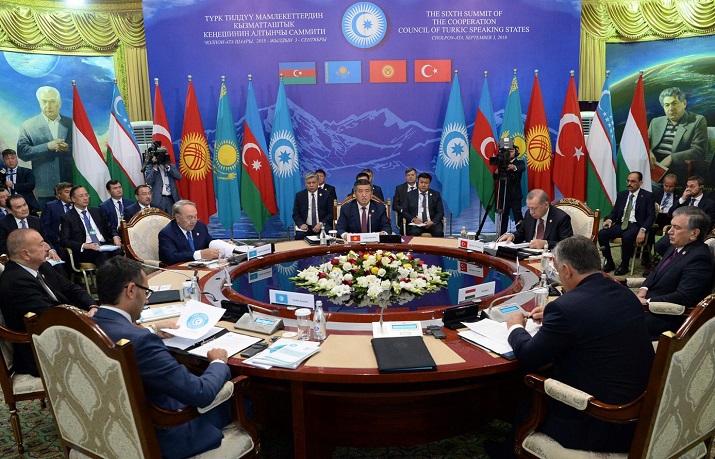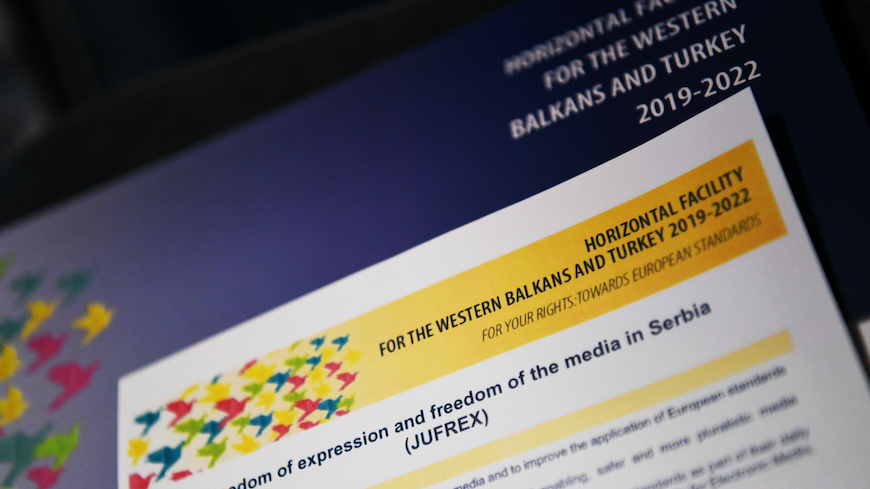The Jamestown Foundation (27 April 2020)
Cavid Veliyev
Following the large coronavirus outbreak in Iran, neighboring countries quickly closed their borders with the Islamic Republic. More than a thousand Turkish trucks carrying goods to Central Asia found themselves stuck at checkpoints due to the closure of the Iran-Turkey and Iran-Turkmenistan borders (Daily Sabah, March 4). As a result, Ankara redirected its cargo trucks to the so-called “Middle Corridor,” a trade route connecting Turkey to Central Asia via Georgia, Azerbaijan and the Caspian Sea. The government of Turkey additionally increased the transit capacities of the Sarp, Turkgozu and Çıldır-Aktaş border gates (crossings) to Georgia. On April 10, during a video summit of the Turkic Council—a multilateral organization of Turkic-speaking states—that was held under the auspices of Azerbaijan’s President Ilham Aliyev, Turkish President Recep Tayyib Erdoğan pointedly underlined the importance of the Middle Corridor.
While the COVID-19 pandemic has negatively affected most international trade and transportation, it has also created new opportunities for some emerging routes. Until recent years, maritime shipping lanes and trade routes across Russia and Iran have connected Europe and Asia. Now, however, the Middle Corridor, through Turkey, Georgia, Azerbaijan and the Caspian Sea, is quickly becoming the shortest trade corridor between East and West.
Currently, Iran and Russia are the main export routes to Central Asia for Turkey. Approximately 30,000 trucks annually use the Iranian route, while another 9,000 trucks traverse Russia to reach the region. Past political disputes among these three countries, however, have created problems for Turkish truckers. In 2014, for example, Iran and Turkey were embroiled in a transit fee dispute (Financial Tribune, October 19, 2014). And, in 2015, after the downing of a Russian jet by Turkish F-16s near the Syrian border, Turkish trucks faced additional hurdles due to intensified Russian customs checks (Hurriyet Daily, November 26, 2015). These past developments and today’s COVID-19 crisis have highlighted Turkey’s need for alternative trading routes.
No comments yet.
- ERBD TO CONTINUE AID PROGRAMS IN ARMENIA The Caucasus and Turkish-Armenian Relations 28.04.2020
- COVID-19 INCREASES IMPORTANCE OF MIDDLE CORRIDOR Central Asia 28.04.2020
-
 TURKIC COUNCIL: SO-CALLED 'ARMENIAN GENOCIDE' USED AGAINST TURKEY AS POLITICAL TOOL
The Caucasus and Turkish-Armenian Relations
28.04.2020
TURKIC COUNCIL: SO-CALLED 'ARMENIAN GENOCIDE' USED AGAINST TURKEY AS POLITICAL TOOL
The Caucasus and Turkish-Armenian Relations
28.04.2020
-
 SUPPORT TO FREEDOM OF EXPRESSION IN SERBIA: GRANT AGREEMENT SIGNED WITH JUDICIAL ACADEMY
The Balkans
28.04.2020
SUPPORT TO FREEDOM OF EXPRESSION IN SERBIA: GRANT AGREEMENT SIGNED WITH JUDICIAL ACADEMY
The Balkans
28.04.2020
-
 FRENCH POLICE WATCHDOG TO INVESTIGATE 'RACIST' INCIDENT
Europe - EU
28.04.2020
FRENCH POLICE WATCHDOG TO INVESTIGATE 'RACIST' INCIDENT
Europe - EU
28.04.2020
-
25.01.2016
THE ARMENIAN QUESTION - BASIC KNOWLEDGE AND DOCUMENTATION -
12.06.2024
THE TRUTH WILL OUT -
27.03.2023
RADİKAL ERMENİ UNSURLARCA GERÇEKLEŞTİRİLEN MEZALİMLER VE VANDALİZM -
17.03.2023
PATRIOTISM PERVERTED -
23.02.2023
MEN ARE LIKE THAT -
03.02.2023
BAKÜ-TİFLİS-CEYHAN BORU HATTININ YAŞANAN TARİHİ -
16.12.2022
INTERNATIONAL SCHOLARS ON THE EVENTS OF 1915 -
07.12.2022
FAKE PHOTOS AND THE ARMENIAN PROPAGANDA -
07.12.2022
ERMENİ PROPAGANDASI VE SAHTE RESİMLER -
01.01.2022
A Letter From Japan - Strategically Mum: The Silence of the Armenians -
01.01.2022
Japonya'dan Bir Mektup - Stratejik Suskunluk: Ermenilerin Sessizliği -
03.06.2020
Anastas Mikoyan: Confessions of an Armenian Bolshevik -
08.04.2020
Sovyet Sonrası Ukrayna’da Devlet, Toplum ve Siyaset - Değişen Dinamikler, Dönüşen Kimlikler -
12.06.2018
Ermeni Sorunuyla İlgili İngiliz Belgeleri (1912-1923) - British Documents on Armenian Question (1912-1923) -
02.12.2016
Turkish-Russian Academics: A Historical Study on the Caucasus -
01.07.2016
Gürcistan'daki Müslüman Topluluklar: Azınlık Hakları, Kimlik, Siyaset -
10.03.2016
Armenian Diaspora: Diaspora, State and the Imagination of the Republic of Armenia -
24.01.2016
ERMENİ SORUNU - TEMEL BİLGİ VE BELGELER (2. BASKI)
-
AVİM Conference Hall 24.01.2023
CONFERENCE TITLED “HUNGARY’S PERSPECTIVES ON THE TURKIC WORLD"









